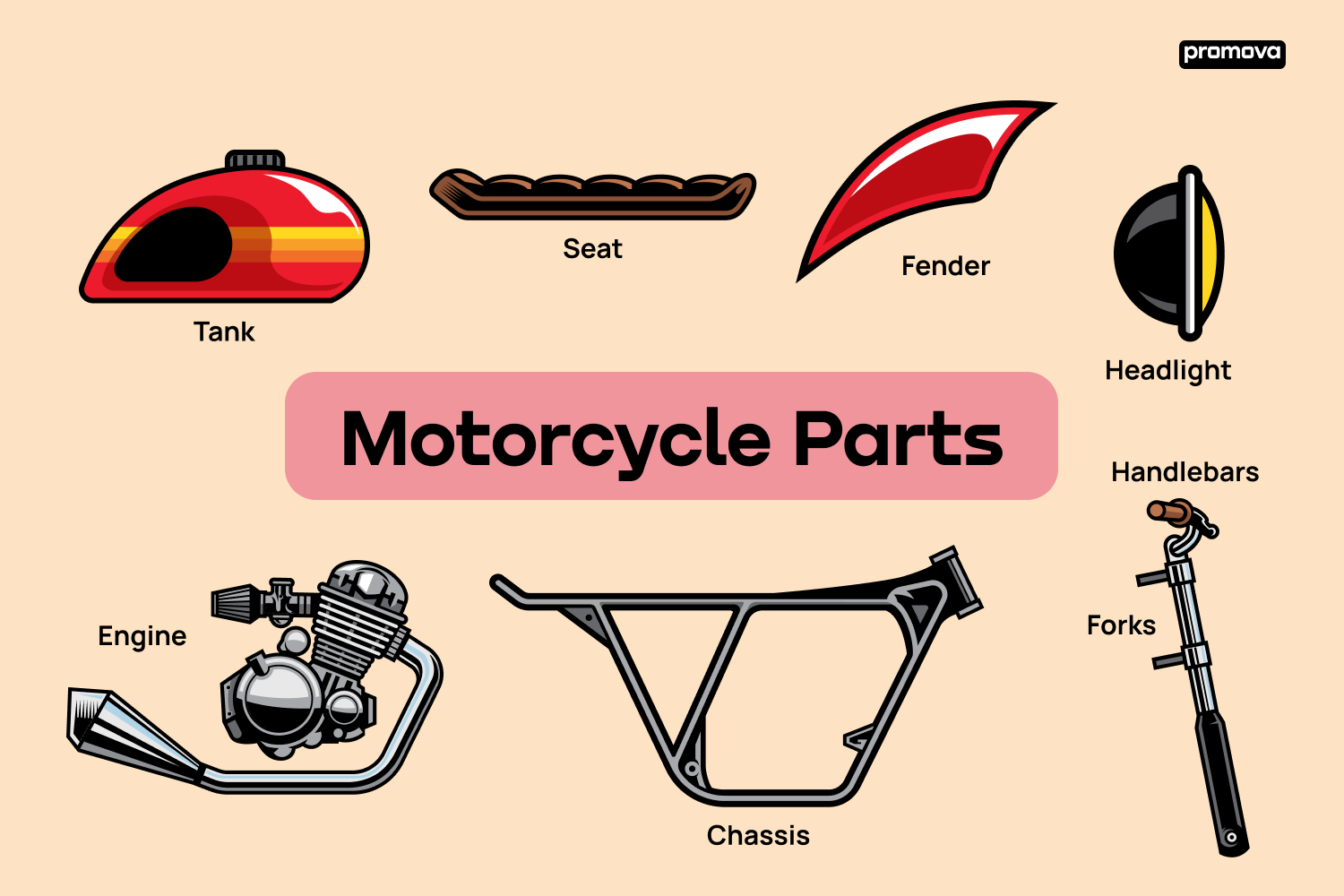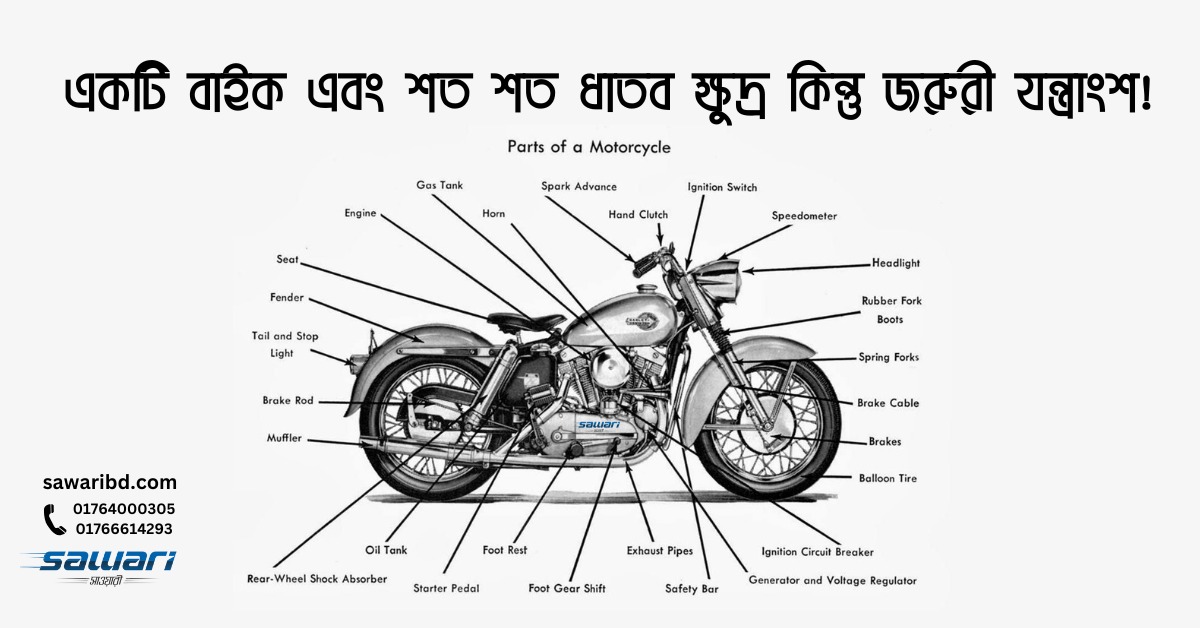Discover the Necessary Motorcycle Components You Required for Optimum Performance
Comprehending the vital parts of a motorcycle is fundamental for achieving peak efficiency. Each element, from the engine to the braking system, plays an essential role in overall performance and safety and security. Regular maintenance can avoid unanticipated failings and boost the riding experience. However, lots of cyclists overlook the complexities of these systems. Finding exactly how they interact can bring about a more efficient adventure. What vital elements should every rider focus on?
The Engine: The Heart of Your Motorbike
The engine offers as the core element of a motorcycle, driving its efficiency and defining its capacities. It is accountable for transforming fuel right into power, which powers the bike forward. Various sorts of engines are utilized, consisting of single-cylinder, V-twin, and inline configurations, each offering distinctive qualities matched for different riding designs and purposes. The engine dimension, commonly determined in cubic centimeters (cc), considerably influences efficiency, with bigger engines normally providing more power and torque.Furthermore, the engine's style and technology, such as fuel shot systems or air-cooling versus liquid-cooling, impact effectiveness and dependability. Maintenance is important for peak procedure; factors like routine oil adjustments and checking spark connects assurance long life. Motorcyclists frequently think about an engine's responsiveness and smoothness, as these features boost the overall riding experience. Eventually, the engine stays an important element that specifies not only the motorcycle's efficiency however also the motorcyclist's link to the maker.
The Transmission: Changing Gears Smoothly
The transmission plays a vital function in a motorbike's performance, particularly in the mechanics of equipment shifting. Understanding exactly how to move equipments smoothly can improve the overall riding experience, while normal upkeep warranties peak performance. Appropriate attention to these aspects can significantly impact the longevity and efficiency of the bike.

Gear Shifting Mechanics
Smooth gear shifting is necessary for suitable motorcycle performance, considerably affecting both acceleration and control. The auto mechanics of gear shifting include the interaction between the clutch, equipment bar, and transmission system. When a biker involves the clutch, it disengages the engine from the transmission, permitting a gear change without harming the parts. A well-timed release of the clutch, combined with exact motion of the gear bar, helps with a seamless change between gears. This procedure ensures that the engine runs within its finest power band, enhancing efficiency. Motorcycle Spares Christchurch. In addition, comprehending the equipment proportions and their effect on speed and torque can assist motorcyclists make notified choices throughout shifts, inevitably adding to a more receptive and pleasurable riding experience
Maintenance Tips Value
Routine maintenance plays a crucial role in ensuring that the transmission system operates effectively, permitting for smooth gear changes. Frequently altering the transmission and examining liquid is essential, as old liquid can cause increased friction and wear. Furthermore, checking the clutch for wear guarantees peak engagement and disengagement, stopping slippage during equipment changes. Lubrication of relocating components is similarly essential to lower rubbing and enhance efficiency. Bike owners need to likewise keep track of for leakages and unusual sounds, as these can indicate underlying issues. By adhering to these upkeep tips, bikers can extend the lifespan of their transmission system, assuring that equipment changes continue to be smooth and adding to the overall performance of their motorbike.
The Braking System: Ensuring Security on Every Experience
Braking systems are basic components that straight influence a motorbike's safety and security and performance. They contain different components, consisting of brake pads, blades, calipers, and hydraulic lines, all interacting to guarantee effective deceleration. The sort of braking system-- typically either disc or drum-- influences responsiveness and stopping power.Regular upkeep is necessary to copyright peak performance; worn brake pads can result in reduced efficiency and enhanced stopping distances. In addition, the top quality of brake liquid must be kept track of, as it can soak up dampness with time, compromising braking efficiency.Riders must likewise consider the significance of anti-lock stopping systems (ABS), which protect against wheel lockup throughout sudden stops, enhancing overall safety and security. Appropriately working brakes are not just concerning quiting; they impart self-confidence in the cyclist, permitting for more secure navigating through various surfaces. Eventually, a dependable braking system is critical for appreciating every experience with satisfaction.
The Suspension: Enhancing Comfort and Control
A well-functioning suspension system substantially adds to a motorbike's total efficiency, matching the efficiency of the stopping system. The suspension plays a significant duty in taking in shocks from unequal surface areas, ensuring a smoother adventure while preserving tire contact with the roadway. This call is vital for both stability and control, permitting motorcyclists to navigate edges with self-confidence and precision.Different kinds of shock absorber, such as telescopic forks or mono-shocks, supply differing levels of comfort and handling. Effectively tuned suspension enhances responsiveness, offering the motorcyclist with a more connected feeling to the motorcycle. Regular upkeep checks are important to ascertain the suspension parts, including dampers and springtimes, are functioning at their ideal. A reliable suspension system not just boosts the riding experience but likewise contributes to the long life of other motorbike parts by reducing damage. Because of this, investing in high quality suspension is vital for any kind of serious motorbike lover.
The Tires: Linking You to the Roadway
Tires play a vital duty in a motorcycle's performance, acting as the main web link in between the road and the motorcyclist. Understanding the various sorts of tires offered can considerably impact dealing with and safety and security. In Full Article addition, normal maintenance is important to guarantee peak tire efficiency and long life.
Tire Enters Explained
Just how do different tire types affect a motorcycle's efficiency? Tire types play a crucial role in determining a motorbike's grip, handling, and stability. Sport tires, developed for high performance, deal improved traction and responsiveness on paved roadways, making them optimal for racing and hostile riding. Alternatively, touring tires focus on toughness and convenience, offering a smoother ride for long-distance traveling. Off-road tires, defined by their sturdy step patterns, stand out in traction on unpaved surfaces, suitable for browse around this site adventure fanatics. In addition, dual-sport tires blend characteristics from both on-road and off-road groups, satisfying functional riding requirements. Ultimately, picking the best tire type is essential for maximizing performance, making certain safety and security, and improving the total riding experience.
Maintenance Tips Offered
While riding on the road, maintaining ideal tire problem is important for security and performance. On a regular basis checking tire stress is necessary, as under-inflated tires can cause bad handling and boosted wear. It is a good idea to inspect walk depth often; used tires compromise hold and security. Furthermore, riders should try to find indicators of damage, such as fractures or lumps, which can show the demand for replacement. Revolving tires periodically assures even use, improving long life. Furthermore, maintaining tires tidy from debris and preventing too much visuals can prolong their life expectancy. Maintaining proper placement and equilibrium adds to peak performance, reducing stress and anxiety on other bike components. Complying with these upkeep suggestions will greatly improve the overall riding experience.
The Gas System: Sustaining Efficiency and Effectiveness
The gas system plays an important role in maximizing a motorbike's performance and performance, as it assures the optimum distribution of gas to the engine. It makes up numerous crucial components, consisting of the fuel tank, gas pump, gas filter, and gas injectors or carburetor. Each part should operate successfully to assure a effective and smooth ride.The gas tank stores fuel and provides it to the engine via the fuel pump, which generates the necessary stress. A gas filter stops pollutants from going into the engine, while the injectors or carburetor mix gas with air for combustion.Proper maintenance of the fuel system is vital; a stopped up filter or malfunctioning injector can cause reduced performance and raised fuel intake. By verifying that the fuel system runs efficiently, riders can enjoy improved throttle feedback, much better fuel economy, and overall boosted riding experience.
The Electrical System: Powering Your Experience
An effective electrical system is vital for the overall performance and security of a motorbike, as it powers critical parts such as the ignition, illumination, and various electronic systems. This system consists of the battery, which stores energy, and the generator, accountable for creating power while the engine runs. The electrical wiring harness links these components, making sure reliable power distribution.Additionally, integrates secure the system from overloads, while relays assist manage high-current tools with low-power signals. A properly maintained electric system boosts performance by making sure smooth beginnings and consistent procedure of lights look at more info and signals, crucial for biker presence and safety.Regular checks of the battery's fee and connections are very important for stopping electrical failings. Bikers ought to likewise examine circuitry for wear and tear, making sure all parts function ideally. Eventually, a durable electric system adds substantially to the overall efficiency and reliability of the motorcycle.
Regularly Asked Questions
Exactly how Usually Should I Change My Bike's Battery?
The regularity of bike battery replacement depends upon use and upkeep (Motorcycle Parts Auckland). Typically, batteries must be changed every 3 to 5 years. Normal checks can aid recognize when a substitute is essential for peak efficiency
What Devices Do I Required for Basic Motorcycle Maintenance?
For standard bike upkeep, one needs necessary devices such as a socket collection, wrenches, screwdrivers, pliers, tire stress scale, and a torque wrench. These tools assist in efficient upkeep and guarantee the motorcycle runs effectively and safely.
Just How Can I Improve My Bike's The rules of aerodynamics?
To boost motorbike the rules of aerodynamics, one need to think about changing fairings, using windscreen expansions, enhancing body setting, and decreasing overall weight. These alterations aid lessen drag, improving stability and gas effectiveness throughout experiences.
What Are the Indications of a Failing Electrical System?
Indications of a stopping working electrical system consist of dimming lights, trouble starting, uneven tool analyses, and blown fuses. Oem Parts New Zealand. Unusual smells or deterioration around battery terminals might likewise suggest underlying problems needing prompt interest for safety and security and efficiency

Exactly how Do I Select the Right Oil for My Motorcycle?
When picking oil for a bike, one should take into consideration the producer's requirements, thickness rankings, and the sort of riding. Furthermore, synthetic versus standard oil can influence performance and engine security, influencing the choice greatly. The engine dimension, commonly determined in cubic centimeters (cc), considerably affects performance, with bigger engines normally providing even more power and torque.Furthermore, the engine's design and technology, such as fuel injection systems or air-cooling versus liquid-cooling, impact efficiency and integrity. A well-functioning suspension system significantly adds to a motorbike's total performance, enhancing the performance of the braking system. The fuel system plays a vital role in maximizing a motorcycle's efficiency and efficiency, as it ensures the optimum delivery of gas to the engine. A gas filter prevents pollutants from getting in the engine, while the injectors or carburetor mix fuel with air for combustion.Proper maintenance of the gas system is vital; a clogged up filter or malfunctioning injector can lead to decreased efficiency and enhanced gas usage. A properly maintained electrical system improves efficiency by making certain smooth starts and constant procedure of signals and lights, important for motorcyclist presence and safety.Regular checks of the battery's charge and links are essential for stopping electrical failures.
Comments on “How-To Guide for Installing New Motorbike Components NZ on Older Bikes”